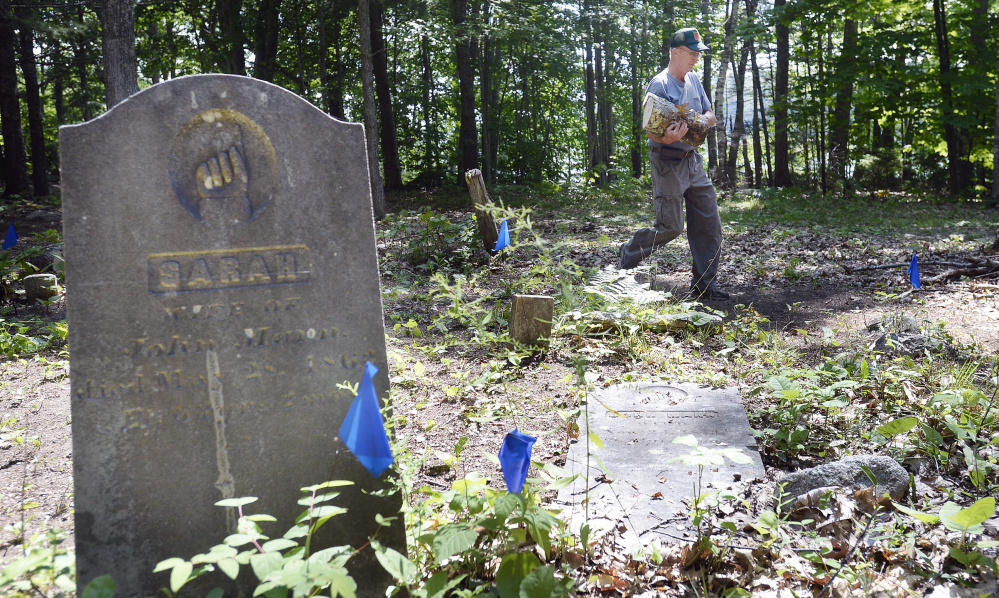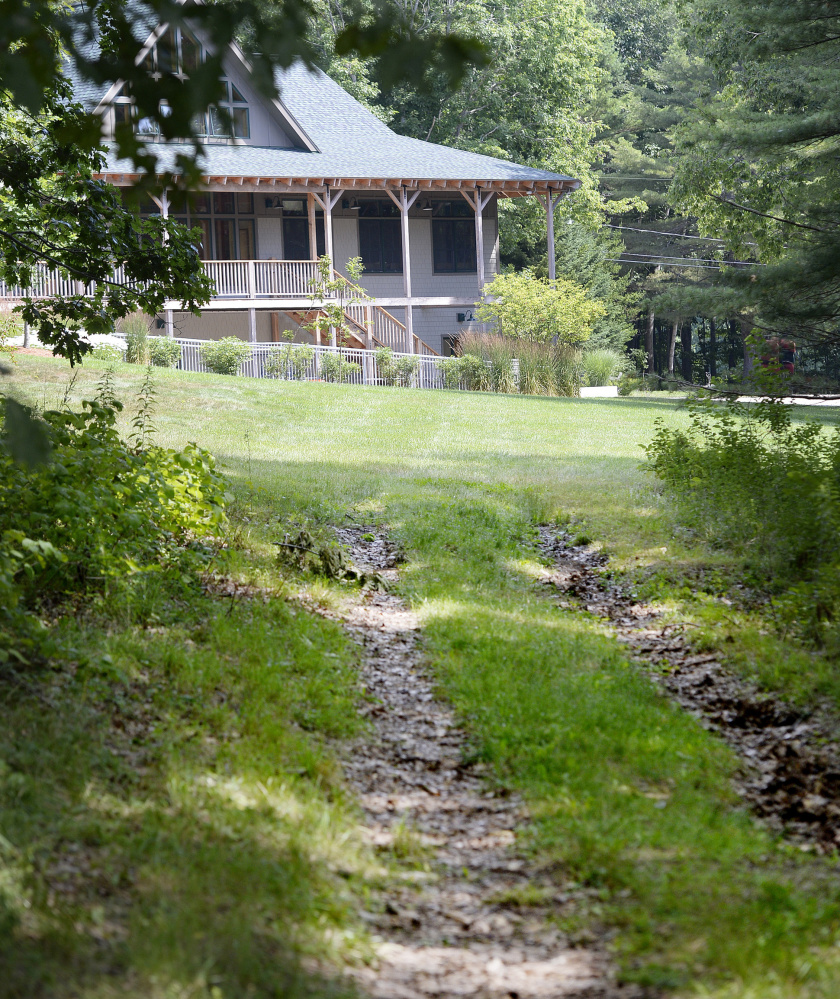FREEPORT — The Mann Cemetery is a difficult place to find.
Reaching the centuries-old burial ground requires driving down a private road owned by L.L. Bean, trespassing across a manicured lawn behind the company’s paddling center and following a rutted track that runs into the woods. There, underneath mature trees, lie the remains of at least 160 people marked by crumbling and fallen gravestones overgrown by underbrush.
It wasn’t always that hard, says Ken Mann, one of the three members of the nonprofit Mann Cemetery Association.
Before L.L. Bean opened its Flying Point paddling center on Marietta Lane in 2014, on property it bought from a Mann family relative in 2003, generations of visitors used a rough track across the property to reach the cemetery. But after the paddling center was approved, the old tote road was dug up to install drainage, then loamed and seeded, erasing a path that stood, by some accounts, for centuries. While the cemetery association has a secondary access, it is through a private gated road that is not open to the public.
Within months of opening the center, L.L. Bean told the association to stop crossing its property to reach the cemetery and filed court papers to prevent association members from gaining legal rights to the old access way. At the same time, the company gave the association ownership of a section of the cemetery that was on its property.
Two years later, residents and descendants of those buried in the cemetery are demanding the company rebuild the track to allow public access to the grave sites, and Freeport’s code enforcement officer is seeking a clarification on whether L.L. Bean, the town’s largest taxpayer, was allowed to remove the road in the first place.
The Freeport Project Review board is scheduled to hold a public hearing on the case in September, after a request from the association and 15 letters from people asking the town to force L.L. Bean to re-establish the road.
The company is challenging the code officer’s action, saying it has done nothing wrong and that the review board has no authority to force it to allow public access on its land. The dispute is on the agenda for an appeals board meeting Monday night.
The issue boils down to competing interpretations of a condition attached to the site plan in 2013. The condition says, the “final plan will show the traditional access to the Mann Cemetery.” What is in dispute is whether that means the company had to keep the road in place or just note its existence on the plan.
“We did loam and seed the road as directed by the originally approved site plan,” L.L. Bean spokesman Mac McKeever said. He said the company also worked to enhance the association’s secondary access to the cemetery.
DATING FROM 17TH CENTURY
The Mann Cemetery has existed since at least 1750, around the time the Freeport area was permanently settled. The last known person buried there was in 1922.
It looks its age, despite maintenance by the Mann family and others.
Dozens of tiny blue flags mark possible graves in a clearing surrounded by mature woodland. A small area surrounded by barbed wire contains the Mann family plot, although members of at least 10 other families also are interred there. Some gravestones have cracked or fallen over. A brass star and tiny American flag mark the grave of a veteran. In the last two years, the association has been raking the area to find more graves, including a well-preserved marker recently uncovered from a layer of leaves and dirt.
“I plan to be buried here,” Ken Mann said.
He can remember his grandfather driving down the access road to tend the family plot, and he’s convinced it was the traditional road for a long time before that.
“The bodies didn’t walk in here on their own,” he said.
In 2011, the Mann family organized the association and acquired part of the cemetery and a second right of way on a private, gated road across a neighboring property. But that access isn’t available to the public and Mann doesn’t feel comfortable allowing people to use the back road without supervision. Instead, he’d like to see the traditional access across L.L. Bean’s property restored.
“Just because you have a back door doesn’t mean you don’t want a front door,” Mann said.
To him, the issue is clear. L.L. Bean said it was going to keep the road, but took it out once the company got a permit for the building.
“If Beans is allowed to do whatever they want with the site plan, what is it going to be, selective enforcement or nothing?” Mann said.
At the time L.L Bean bought the property off Lower Flying Point Road in 2003, the company was not aware of a cemetery on the property, according to documents filed with the town in June.
During the permitting process, the company agreed that the site plan would show the traditional access to the Mann Cemetery.
The conflict over access to the cemetery, which has simmered since the paddling center opened in 2014 and the road was removed, came to a head this May when Freeport Town Manager Peter Joseph asked code enforcement officer Fred Reeder to determine if removing the road was a violation of L.L. Bean’s site plan.
Reeder decided that requiring the company to show the traditional cemetery access on the site plan meant the road should have been rebuilt after construction.
“It seems clear to me that the board wanted the access shown and therefore re-established,” said Reeder, who admitted there were conflicting interpretations.
NO ‘REQUIREMENT’
The company says putting the road on the site plan did not obligate it to rebuild the road after construction of the paddling center. The project review board also has no authority to force the company to allow public access on its land since there is no existing legal right of way, the company said.
Nowhere on the site plan is there “a requirement that L.L. Bean build a road or otherwise provide access to the Mann Cemetery users over its Flying Point property on the old tote road or otherwise,” Martin Eisenstein, an attorney representing the company, said in a June statement to the board.
In July, L.L. Bean sent a letter to the association, offering its portion of the cemetery and prohibiting association members from crossing its property because, it said, Mann had repeatedly driven across the old road.
“Ken’s actions have forced us to post signs to limit access in order to protect the children and other guests at our property,” the company stated.
The association accepted the company’s gift, but called out “unreasonable accusations” made against Mann and complained about interactions with an employee of L.L. Bean.
“Any claim by the Mann Cemetery Association that it has a right to cross L.L. Bean’s property is a private dispute between the association and L.L. Bean and could not have been considered – and certainly not be resolved – by the Project Review Board,” Eisenstein said in his June statement.
Send questions/comments to the editors.




Comments are no longer available on this story